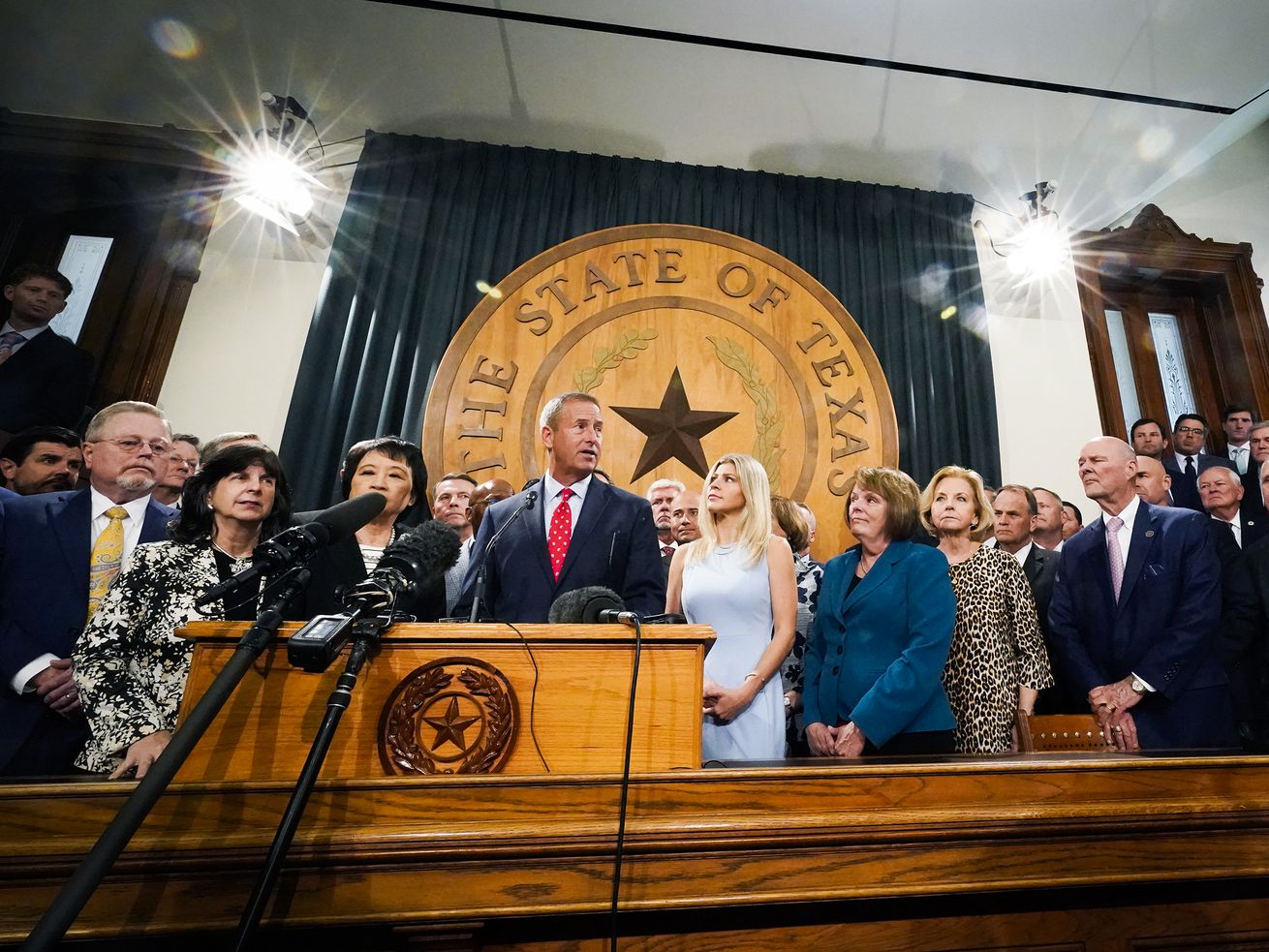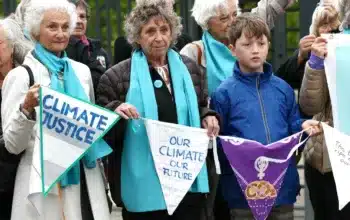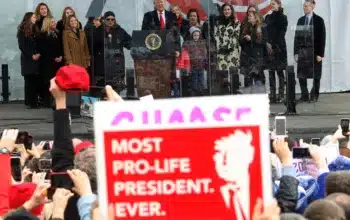Republican lawmakers in Texas have put political ambition above public good amid statewide crises.
Republicans in Texas are on a warpath.
They’re fighting to fortify their trifecta control of state government despite a rapidly diversifying electorate, and to establish themselves as the bastion of arch-conservatism in the United States. Victory seems imminent, at least in the upcoming election cycle, if not in the years thereafter. But the people of Texas — Republican, independent, and Democrat — have become collateral damage. Because in having dedicated themselves to battle, Texas Republicans have forgotten how to govern.
This is certainly the case for the Texas legislature, whose GOP majority has just led it through its most conservative session in decades. During that session, GOP lawmakers failed to pass much-needed structural reforms to the state’s electrical grid after it collapsed during a catastrophic winter storm earlier this year, as well as a federal Medicaid expansion program that would have given health care coverage to 1.4 million uninsured Texans amid a raging pandemic. Instead, the legislature has prioritized bills that allow any adult in the state to carry a handgun without a license or permit and that ban abortions after six weeks.
/cdn.vox-cdn.com/uploads/chorus_asset/file/22781206/AP21198714461243_copy.jpg) Eric Gay/AP
Eric Gay/APIt is now on track to enact one of the most restrictive voting laws in the country after an effort that has literally rendered the legislature unable to govern: Democrats fled the state to deprive the legislature of the quorum it needs to operate to protest the bill, leaving Texans without a representative governing body. In response, the Republican House speaker did not offer to negotiate a policy compromise, but has tried to arrest the Democrats who fled.
Republican Gov. Greg Abbott, meanwhile, has become a prominent national right-wing figure on both immigration and the pandemic.
He has waded into battles with the Biden administration over the US-Mexico border, setting off on a misleading quest to construct a wall on his own (the taxpayer funds he’ll use for the effort are enough for only a few miles of wall, at most) and falsely claiming that migrants are behind Covid-19 surges. And as the delta variant is infecting almost 12,000 Texans a day in reported tests, he has also refused to reinstate mask mandates at the state level, banned local governments from doing so, and sued those that defy him.
/cdn.vox-cdn.com/uploads/chorus_asset/file/22781210/GettyImages_1233910101_copy.jpg) Tamir Kalifa/Getty Images
Tamir Kalifa/Getty ImagesIt’s all a bid to keep the GOP base happy in the lead-up to next year’s midterm elections, as Republicans in the state are more concerned about potential primary challenges from the right than any serious offensive from Democrats. But with their focus on raising their political profiles and defeating potential rivals, they have forgotten to actually govern amid several statewide crises in recent months: the winter storm that left tens of thousands without power and in the cold, the arrival of increasing numbers of migrants at the border, and the recent resurgence of Covid-19 cases due to the delta variant.
According to Brendan Steinhauser, a GOP strategist based in Austin who ran Texas Sen. John Cornyn’s 2014 reelection campaign, Republicans are just doing their job by responding to what Texas Republican voters want: “The voters are driving Republican policies,” Steinhauser said.
But at some point, elected officials have a responsibility to protect the health and safety of their constituents and the basic human rights of anyone who passes through their state, even if it’s not what their base wants. Few Texas Republicans have embraced that sense of duty; state Rep. Lyle Larson, a Republican from San Antonio, has been a lone dissenting voice calling on his colleagues to “do the right thing with no expectation of getting re-elected” on issues like Covid-19, Medicaid expansion, and election law.
“We’ve come to a point where Republican elected officials in Texas treat their jobs like they’re Fox News contributors as opposed to people with responsibilities to their constituents,” said Zack Malitz, co-founder of the progressive Real Justice PAC and a former adviser on Democrat Beto O’Rourke’s 2018 Texas Senate campaign.
Malitz’s view reflects the general frustration of Democrats. But there is a limited amount they — or anyone concerned about Texas government — can do. The reality of how districts are drawn, as well as Texas Republicans’ push to restrict voting, means many of those GOP lawmakers with little interest in lawmaking are likely to hang on to their seats next year. And that means the problems Texans have faced due to their government’s neglect are likely to continue.
The Texas legislature is scoring political points at the expense of addressing the most pressing issues
For a while after the 2018 elections, Texas Republicans were focused on bread and butter issues like property taxes and school finance that wouldn’t offend many independents and Democrats. Democrats made some major inroads that year, not just retaking the US House, but also picking up 12 seats in the Texas House and two in the Texas Senate. That shook Republicans’ confidence a bit, and left them looking to play it safe.
But after Democrats’ predictions that they would turn Texas blue in 2020 failed to come to fruition, Republicans felt that they were given a mandate, marking the return of culture war-type issues that most energize their base in the Texas legislature.
“In Texas, Republicans still win statewide and have done so in the last couple of election cycles, even though we had some narrower races in 2018,” Steinhauser said. “If you’re a Republican running statewide, you still have to speak to the Republican Party first, not only to get the nomination, but to turn them out and win in November.”
That pressure has manifested in what Steinhauser described as the most conservative session of the state legislature in his memory. The governor has already signed legislation that removed permit requirements to carry a handgun and also established an effective ban on abortion that is currently facing legal challenges.
But there is also a special session of the state legislature underway where lawmakers are supposed to work on legislation that would prevent schools from teaching critical race theory or mandating masks or Covid-19 vaccines, and to provide funding for border security, among other Republican causes.
All the while, the failure of the Texas power grid during the winter storm — a statewide crisis that impacted Texans regardless of political party — has been glossed over. Though the governor signed laws to prepare the electrical grid to withstand future extreme weather events, the legislature hasn’t passed any bills delivering direct relief for consumers who were slammed with huge electricity bills as a result of the blackouts or making the kind of forward-looking structural changes to Texas’s electricity market that many experts have called for.
/cdn.vox-cdn.com/uploads/chorus_asset/file/22781221/AP21194749783455_copy.jpg) Eric Gay/AP
Eric Gay/AP/cdn.vox-cdn.com/uploads/chorus_asset/file/22781229/GettyImages_1234359341_copy.jpg) Mark Felix/Bloomberg via Getty Images
Mark Felix/Bloomberg via Getty ImagesNor did the legislature, in either their regular or special sessions, find time to address many other pressing concerns in Texas, like Medicaid expansion and police reforms that were proposed in the aftermath of former Houston resident George Floyd’s death.
“These cultural war issues get people to hunker down in the trenches that they’re used to being in around elections and refocus voters’ attention on how much they hate the other side,” Malitz said. “These issues are being deliberately used as a distraction from really widely felt stuff in Texas right now: Covid, economic recovery, the blackouts, baseline bad governance.”
Republicans are also trying to strip Texans of the only tool they have to demand good governance with a bill that would make the state’s already very restrictive voting laws even more so. It passed the state Senate on Thursday despite a more than 15-hour filibuster from an Austin Democrat, but still needs to pass the House and be signed by the governor.
As my colleague Ian Millhiser notes, the bill would strengthen constraints on absentee voting; ban drive-through polling sites; introduce new limitations and paperwork requirements on people who help disabled voters and non-English speakers cast a ballot; make it harder to remove partisan poll watchers who harass voters or otherwise disrupt an election; and impose harsh new penalties on people who commit even minor violations of Texas election law.
Steinhauser said that Texas Republicans are more unified behind that agenda than they have been in a long time.
“Part of that is probably the party being out of power nationally and having a common political enemy, if you will — to have the White House and Nancy Pelosi and Chuck Schumer to point to,” he said. “Also having Trump be a little less front and center in the party has allowed them to focus their critiques on national Democrats.”
But for Texas Democrats, there isn’t room for compromise on the Republican agenda. House Democrats had fled the state en masse last month in an effort to prevent votes on the voting bill in particular. But after Republican Speaker Dade Phelan signed civil arrest warrants for absent Democrats on Tuesday night with a green light from the Texas Supreme Court, nearly enough of them have returned to form a quorum, a two-thirds majority of the chamber required to conduct business, giving the Republican majority a chance to move forward with their agenda.
Though Republicans have decried Democrats’ actions as breaking relationships in a chamber that has historically sought to give the minority party a seat at the table, Republicans had already drawn battle lines with a legislative agenda designed to exploit partisan divisions.
Gov. Abbott has tried to pass off his failures on the Covid-19 resurgence on migrants
Beyond the problems with the legislature, Texas is in the middle of another statewide crisis: a third wave of Covid-19, this time brought on by the highly contagious delta variant. It has left hospitals with dwindling numbers of ICU beds and delaying non-emergency medical procedures while the governor calls in out-of-state medical staff to come to the rescue.
Nevertheless, Abbott hasn’t budged in refusing to use his gubernatorial powers to try to get rising case — and death — numbers under control. He could, for instance, implement statewide mask or vaccine mandates, but will not, saying that curbing the epidemic now comes down to “personal responsibility.”
He has instead actively worked against the interests of public health, issuing an executive order that prohibits any government entity from issuing its own mask mandates, effectively hamstringing local governments that are bearing the brunt of Covid-19 surge in keeping Texans safe. Several counties have gone ahead and implemented mask mandates anyway, but Abbott is going to court in an effort to reverse them.
Though he has praised the vaccine and has gotten the jab himself, Abbott is focused on protecting the rights of the unvaccinated.
/cdn.vox-cdn.com/uploads/chorus_asset/file/22781271/GettyImages_1234463888_copy.jpg) Callaghan O’Hare/Bloomberg via Getty Images
Callaghan O’Hare/Bloomberg via Getty Images“They have the individual right and responsibility to decide for themselves and their children whether they will wear masks, open their businesses and engage in leisure activities,” Abbott told the Dallas Morning News. “Vaccines, which remain in abundant supply, are the most effective defense against the virus, and they will always remain voluntary — never forced — in the State of Texas.”
Steinhauser said that Abbott is trying to balance the desire of millions of Texans not to return to the shutdowns of last year with the real immediate need to get millions more Texans vaccinated. Democrats, however, see it as an abdication of the governor’s responsibility to protect public health.
“This is beyond inaction — this is the governor tying the hands of health experts who are trying to keep Texans healthy as cases and hospitalizations increase,” Texas state Rep. Donna Howard, a former critical care nurse, said in a statement.
What’s more, Abbott has sought to blame the recent delta surge on migrants arriving on the southern border — playing into a false, nativist, and damaging right-wing narrative that might be particularly attractive to Republican voters in the state, who have long identified immigration and border security as top priorities in public opinion polling.
At a national level, a recent Axios poll found that nearly 37 percent of unvaccinated Americans blame “foreign travelers in the US” for the rise in Covid-19 cases. Abbott has played no small part in creating that perception.
They’re “allowing free pass into the United States of people with a high probability of Covid, and then spreading that Covid in our communities,” he said in an interview last month on Fox News.
But available data hasn’t shown migrants on the border to be any more likely to test positive for Covid-19. In March, the acting head of the Federal Emergency Management Agency (FEMA) told Congress that less than 6 percent of migrants at the border had tested positive for Covid-19, a lower percentage than the Texas positivity rate at that time.
Scapegoating migrants serves two purposes for Abbott: It obscures his role in failing to prevent the current Covid-19 surge and provides him with an excuse to pursue the kind of restrictive immigration policies that former President Donald Trump both popularized and made a priority.
/cdn.vox-cdn.com/uploads/chorus_asset/file/22781273/GettyImages_1233738317_copy.jpg) Sergio Flores/AFP via Getty Images
Sergio Flores/AFP via Getty ImagesHe recently issued an executive order allowing public safety officers to stop and reroute vehicles suspected of transporting migrants with Covid-19, though the measure has been blocked in federal court for now.
He has told Texas child care regulators to revoke the licenses of facilities that house migrant children and state troopers to jail migrants for state crimes, such as trespassing on private property when they cross the border.
And he is trying to finish the wall along the Texas border, putting forth a $250 million “down payment” drawn from state disaster relief funds — money that could have gone to the aid of those still recovering from last winter’s storms, or those struggling under the burden of the pandemic — and crowdfunding almost another $500,000 as of June 23. That’s still a drop in the bucket of what he might need to finish the project, which the federal government estimated could cost as much as $46 million per mile in some sectors of the border.
But it doesn’t really matter if Abbott finishes the wall or whether his executive order is ever allowed to go into effect. The policies have generated news cycles that boost his profile nationally, which will be important if he pursues a 2024 presidential bid as rumored.
“It’s a fantastic talking point for his primary electorate, both next year and in 2024,” Malitz said. “It’s government by theater. The things that they are doing with government in Texas are, by and large, for the purpose of introducing a message into the right wing media machine with obviously catastrophic humanitarian results.”
Abbott and his fellow Texas Republicans have been very successful at controlling messaging, and have had many wins in energizing state conservatives. Their party is poised to retain control of Texas. But these victories have come at a great cost, carried by the people of Texas.
Author: Nicole Narea
Read More



